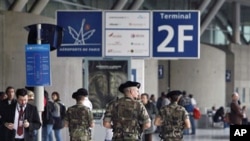Concern is growing about possible terrorist strikes in Europe. The United States, Britain, France and Japan issued travel warnings this week and on Tuesday French authorities arrested a dozen suspects with possible ties to Islamist extremists.
St. Lazare train station in Paris, a major travel hub that was briefly evacuated last week following a bomb alert that proved to be a hoax. Authorities have also twice evacuated another Paris landmark, the Eiffel Tower, as concern grows across Europe of a major terrorist attack.
But those worries have not stopped 22-year-old French student Marion Hebert from commuting regularly to Paris from her home city of Rouen, via St. Lazare.
Hebert says she is not overly concerned about terrorism alerts because French are always hearing about a new threat.
Alerts issued earlier this week by the United States, Britain, France and Japan warned their citizens traveling in various parts of Europe. The warnings are vague. The United States, for example, has generally warned Americans to avoid major tourist attractions and transportation hubs.
News reports suggest authorities are concerned about al-Qaida attacks in Europe similar to the 2008 strikes in Mumbai, India.
On Tuesday, authorities in southern France arrested a dozen people with suspected ties to Islamist extremists. It is not immediately clear if the arrests were linked to the latest terrorism concerns.
But the fears have not changed the travel plans of one American retiree, Roy, who was waiting for a train at St. Lazare with a group of friends.
"It is something to be aware of. We are not really worried about it. We are just trying to be vigilant, pay attention. It has not changed our plans," he said.
Same response from one South Korean tourist, who gave her name as Amy. She was heading into Galleries Lafayette, a Paris department store that is popular among tourists.
"I heard today, this morning, in the news. I heard it is kind of dangerous right now, but I am not really worried," said Amy.
In London, international security expert Bob Ayers notes city residents are no stranger to terrorist strikes, having weathered those by the Irish Republican Army as well as the 2005 bombings by Islamist extremists on London's mass transit.
"The Londoners became very familiar with it. It is nothing anybody welcomes or relishes but you learn to live through it," said Ayers. "Even when we had the two bombings [in 2005] several years back, the Londoners got back on the tubes the next day and went back to work."
French and Spaniards are also hardened by terrorist strikes in their countries, both by Islamist extremists and nationalist groups. And, Ayers says, there really is not much the public can do to respond to these latest warnings.
"I am not sure there are any precautions that are possible to take. If the terrorists are targeting national monuments, if they are targeting places where people congregate like restaurants, supermarkets, the bank, athletic events - the only way to take precautions would be to stay in your house and never go out," he said.
While Ayers says Europe remains a easy target for terrorist attacks. He also notes that reports suggest American and European intelligence services appear to be working very well in trying to root out potential threats.















